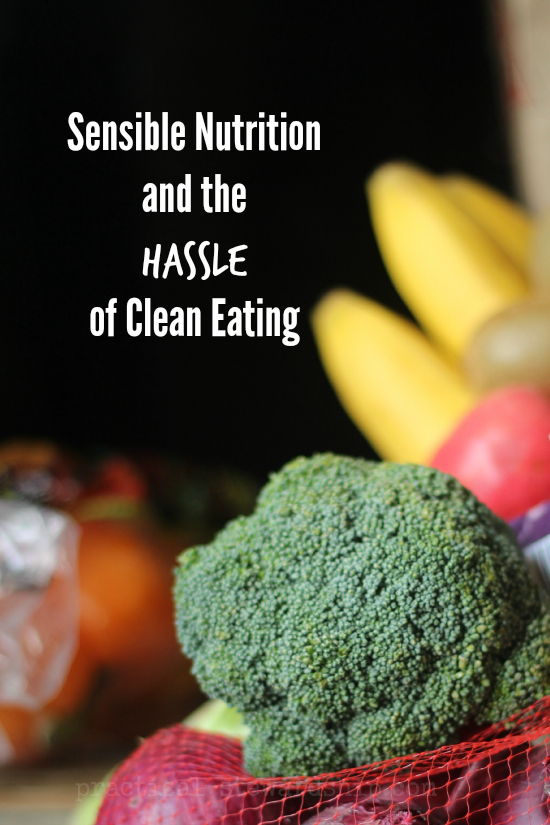Sensible Nutrition and the Hassle of Clean Eating

Organic vs. Conventional? Grass-fed vs. Corn-fed? Non-GMO vs. GMO?
How is a person supposed to keep all this straight? Does it even matter?
These are fair questions, and well worth asking.
I believe the most healthy diet would be completely organic (so, non-GMO) and would include only free-range, grass-fed, antibiotic-free meats and eggs. And I’d drink only pure water. And it’d only rain at night.
I don’t eat like that. And I’m not planning on it anytime soon.
For a few reasons. I’ll give three.
It’s almost impossible in 21st century America. If you actually live with people, in a community and buy your food at stores, then this dietary commitment makes for a relatively narrow and expensive diet. If you live more remotely and can grow or raise some of your own food, it’s actually much simpler to attain. Grass fed ground beef? $7.50 per pound. Conventional ground beef? $3.50 per pound. Organic broccoli? $1.99 per pound. Conventional broccoli? $0.99 per pound. Get the idea? Then try to find organic raw milk, or raw milk cheese or yogurt at your local supermarket. It’s hard.
I am committed to feasting. I believe that feasting and the hearty enjoyment of God’s bounty is a potent weapon for Christians, and there is a pile of nonorganic, unhealthy foods that – consumed in moderation from a grateful heart – makes for very happy feasting! From graham cracker crusts to my pies, my favorite beers, and most of the chocolate I eat, strategic and moderate consumption of foods like these in fellowship with others makes me happy.
I don’t ever want to alienate people needlessly. There’s nothing quite like the food snob who turns up his nose at anything processed as though it were doggy poo on a plate. I admire the generations of dominion takers who have striven to improve our nutrition. I appreciate the ability to preserve foods in packages and the science behind the genetic modification of organisms (that’s what GMO stands for, by the way: genetically-modified organisms, but most of you already know that). So I’ll eat them now and again for sake of feasting and fellowship…especially when they’re served to me at someone else’s house. This is sensible. But we eat far fewer of them at our own dinner table than we did a decade ago.
If you’ve spent any time around this blog, you probably know that we’re interested in healthy decisions that make sense. That means that – for all intents and purposes – we don’t believe in dieting. Dieting doesn’t work because you have built into it a target date to end your diet and, most likely, return to what’s comfortable. The usual outcome here is also a return to your old weight and level of health.
It’s the same principle with everything. Proverbially speaking, don’t bite off more than you can chew. But on the matter of sensible nutrition, how does a person start to eat better in a realistic, sustainable way? You know, something he can stick with from now on? Some folks (Sonja, for one) think we should shoot for an 90/10 breakdown; eating clean 90% of the time and however you want the other 10%. That’s a potentially-helpful idea, but I don’t tend to think in those ratios, and I don’t count carbs or calories.
To be clear, our family eats well. We have committed to spend money on good food that we hopefully won’t be spending on medical bills down the road. We drink organic milk and buy mostly organic produce, but we also buy ketchup and non-gmo chocolate and tortillas and other things with more that three ingredients on the label. So I’m a clean-eating sympathizer, though I’m not there completely myself, and that by design. This is about practicing excellent stewardship of my body, my finances and, most importantly, my relationships, and my moderately-clean diet helps this.
What about you? Are you committed to clean eating? Sometimes? All the time? Why? We’d love to hear in the comments below.
Thank you for a well-written stand on clean eating. It’s difficult in these times to find a Christian perspective on how we should enjoy God’s earth without destroying it, or going overboard and hurting our pocketbooks!
I appreciate both you and your wife’s blogs (and recipes) and wish you all success in the future!
Blessings, Colleen Peterson Chetek, WI
Thanks so much, Colleen. I appreciate that.